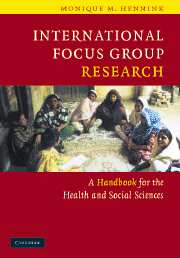Book contents
- Frontmatter
- Contents
- List of figures
- Preface
- Acknowledgements
- 1 Introduction to focus group research
- 2 Planning international focus group research
- 3 Preparing the discussion guide
- 4 Training the focus group team
- 5 Participant recruitment
- 6 Group composition
- 7 Number of groups and group size
- 8 Focus group location
- 9 Conducting the group discussion
- 10 Recording the focus group discussion
- 11 Data preparation and analysis
- 12 Reporting focus group research
- References
- Index
5 - Participant recruitment
Published online by Cambridge University Press: 12 January 2010
- Frontmatter
- Contents
- List of figures
- Preface
- Acknowledgements
- 1 Introduction to focus group research
- 2 Planning international focus group research
- 3 Preparing the discussion guide
- 4 Training the focus group team
- 5 Participant recruitment
- 6 Group composition
- 7 Number of groups and group size
- 8 Focus group location
- 9 Conducting the group discussion
- 10 Recording the focus group discussion
- 11 Data preparation and analysis
- 12 Reporting focus group research
- References
- Index
Summary
Introduction
Recruiting participants for the group discussions is one of the fundamental tasks of focus group research. Participants in focus group research are recruited non-randomly (sometimes referred to as ‘purposive’ recruitment), according to criteria specific to the research objectives. There are a wide variety of participant recruitment strategies for focus group research; the most appropriate strategy to adopt will be influenced by the characteristics of the study population and the context of the research. The process of participant recruitment will be determined by whether the study participants are members of the general community or represent specific sub-groups of the population. The research context will also determine the most appropriate recruitment strategy to adopt. For example, participant recruitment in developing country contexts typically involves following local protocol to seek endorsement for the research and seeking assistance from local ‘gatekeepers’ in gaining access to community members. Recruitment in developing country contexts also makes use of the often close-knit social structures, which can be beneficial in quickly identifying appropriate participants. This chapter describes a range of strategies to recruit focus group participants and the situations in which each strategy is most applicable.
What is participant recruitment?
Participant recruitment refers to the process of identifying individuals with certain characteristics and inviting them to participate in the group discussion. Careful selection of participants is essential to create an environment suitable for productive discussion. Participants in focus group research are typically selected non-randomly, and according to certain criteria specific to the research objectives.
- Type
- Chapter
- Information
- International Focus Group ResearchA Handbook for the Health and Social Sciences, pp. 93 - 114Publisher: Cambridge University PressPrint publication year: 2007



